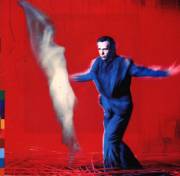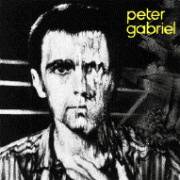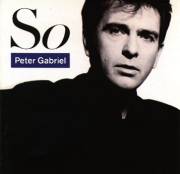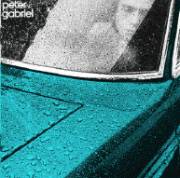PETER GABRIEL: A WORLD
OF MUSIC, ART AND DANCE
By: Emma Dors.
Recently we devoted an
article to the WOMAD (World of Music, Arts and
Dance) project, promoted by Peter Gabriel so as
to support the arts of the traditional and contemporary cultures
with different educational programs, performances and recordings,
whose festivals have been taking place in more than seventy
countries since its beginnings. Yet we may ask ourselves, what
about WOMAD's creator? Who is this giant of
modern music, whose work both in his solo career and in his
collaborations with other musicians has not ceased to harvest
success after success? In this article we will try to answer
these questions.
 Peter Brian Gabriel was born on February
13, 1950 in Woking, Surrey (Great Britain). His beginnings in the
musical world were at the drums, working for several soul and
rock bands, before he founded a collective of songwriters in
1966, at his high school, together with some of his schoolmates,
which was christened as The Garden Wall. This
collective would soon become the famous band Genesis,
with Gabriel as its leader, main songwriter and
vocals. The band, with such musicians as Steve Hackett,
Phil Collins, Mike Rutherford and Tony Banks,
whose musical skills are considerable as well, soon make
themselves well known all over the world thanks to their
elaborate performances, their theatrical flair and the risky
manner they face musical creativity in the making of a richly
textured music, complex, well done, thus developing a peculiar
way of understanding sound within the realm of progressive
symphonic rock, this being a label that more or less adequately
describes the kind of music the band choose to express their
inner creative strength. Genesis succeed in
attracting a great deal of followers and fans throughout their
seven albums: From Genesis to Revelation (1969), Trespass
(1970), Nursery Cryme (1971), Foxtrot (1972), Genesis
Live (1973), Selling England by the Pound (1973)
and The Lamb Lies Down on Broadway (1974).
Peter Brian Gabriel was born on February
13, 1950 in Woking, Surrey (Great Britain). His beginnings in the
musical world were at the drums, working for several soul and
rock bands, before he founded a collective of songwriters in
1966, at his high school, together with some of his schoolmates,
which was christened as The Garden Wall. This
collective would soon become the famous band Genesis,
with Gabriel as its leader, main songwriter and
vocals. The band, with such musicians as Steve Hackett,
Phil Collins, Mike Rutherford and Tony Banks,
whose musical skills are considerable as well, soon make
themselves well known all over the world thanks to their
elaborate performances, their theatrical flair and the risky
manner they face musical creativity in the making of a richly
textured music, complex, well done, thus developing a peculiar
way of understanding sound within the realm of progressive
symphonic rock, this being a label that more or less adequately
describes the kind of music the band choose to express their
inner creative strength. Genesis succeed in
attracting a great deal of followers and fans throughout their
seven albums: From Genesis to Revelation (1969), Trespass
(1970), Nursery Cryme (1971), Foxtrot (1972), Genesis
Live (1973), Selling England by the Pound (1973)
and The Lamb Lies Down on Broadway (1974).
In spite of their
numerous hits in the band, Peter Gabriel feels
the need to explore new paths, new musical terrains which allow
him to express his musical creativity even better, and he leaves
the band in 1975, so as to embark on a solo career even more
fruitful than what he has been doing so far. Although his first
three albums are released under the generic title of Peter
Gabriel, these are best known with other names. The first
one was Rainy Windshield (1977), which included the
famous piece "Solsbury Hill". The second one, going by
the name of Fingernails (1978) includes another well
known hit: "D.I.Y.". And in the third album, Melting
Face (1980), we find two themes that would illustrate his
ideas with respect to the unity of all races, intercultural
cooperation and the mutual understangding of all the peoples on
Earth: "Games Without Frontiers", a theme that was to
reach both the British and the American top lists, and
"Biko," composed as a homage to the South African
activist whose fight against the infamous apartheid politics
caused him to be assassinated by the racist police forces in the
country in their futile attempt to maintain an unsustainable
situation for the party then in power in 1977. This latter song
would be revitalized in 1988 with the movie Cry Freedom,
by Richard Attenborough, a film whhere the life
and death of Steven Biko were to contribute to
spreading the word of the anti-apartheid fight in South Africa
all over the world. With respect to the purely musical qualities
of this new stage in the artist's career, even though his two
first solo works have a more personal, intimate character, as
seen in the expression of feelings and emotions with acoustic
instruments rather than focusing on the sound per se, his third
album is more experimental and technology-oriented, as seen for
instance in the reverse recording of sounds, or the introduction
of different sounds, apart from the fact that this album was a
pioneer in the introduction of the Fairlight CMI synthesizer in a
British recording studio.
 In 1982 Peter Gabriel signs a contract
with the American label Geffen Records, where
his new album, Security, is released. Both the album and
the single extracted from it are certified gold, besides reaching
the top 40 lists. This very same single, Shock the Monkey,
also is nominated for the Grammy. His next album for
this label, a double one recorded live during his American tour
the previous autumn, is released a year later.
In 1982 Peter Gabriel signs a contract
with the American label Geffen Records, where
his new album, Security, is released. Both the album and
the single extracted from it are certified gold, besides reaching
the top 40 lists. This very same single, Shock the Monkey,
also is nominated for the Grammy. His next album for
this label, a double one recorded live during his American tour
the previous autumn, is released a year later.
Despite having renounced
to a place at a cinema school in his youth so as to pursue a
career in music, Peter Gabriel has always felt a
special interest in the possibilities offered by the world of the
image and its links to the musical language. Such an interest
would become instrumental in his developing several movie
soundtracks, where he creates very special atmospheres, as ve can
see for example in the soundtrack he created for Alan
Parker's movie Birdy, whose album was released
in 1984, as well as in his excellent musical videos and his
multimedia, interactive CD-ROMs, where he proves to have an
unsurpassed talent in the use of the latest technologies to
create interactive Art of the best quality.
 In 1986 Peter Gabriel releases So,
his second solo studio album under the label Geffen,
after about four years of silence in this sense. Only in America
this new work comes to sell more than three million copies,
staying #2 on the top lists for a considerable amount of time.
The album includes the singles Sledgehammer, which
reached number one, Big Time, included in the top ten
list, and In Your Eyes, also in the top 40 list. This
latter theme was to be likewise included in the soundtrack of the
movie Say Anything. Peter Gabriel is
once again nominated for the Grammys for
"Album Of The Year", for Sledgehammer, for
Rock Vocal, Record, and Song Of The Year. Besides, the music
video of Sledgehammer becomes a classic of its genre,
also nominated for an award, while the Rolling Stone
magazine ranks it #1 in video history in "The 100 Top Music
Videos" on October 14, 1993. This same video wins nine MTV
awards, which is in fact something never seen before, including
the Best Video Award as well as the prestigious Video Vanguard
Award for his successful career in 1987.
In 1986 Peter Gabriel releases So,
his second solo studio album under the label Geffen,
after about four years of silence in this sense. Only in America
this new work comes to sell more than three million copies,
staying #2 on the top lists for a considerable amount of time.
The album includes the singles Sledgehammer, which
reached number one, Big Time, included in the top ten
list, and In Your Eyes, also in the top 40 list. This
latter theme was to be likewise included in the soundtrack of the
movie Say Anything. Peter Gabriel is
once again nominated for the Grammys for
"Album Of The Year", for Sledgehammer, for
Rock Vocal, Record, and Song Of The Year. Besides, the music
video of Sledgehammer becomes a classic of its genre,
also nominated for an award, while the Rolling Stone
magazine ranks it #1 in video history in "The 100 Top Music
Videos" on October 14, 1993. This same video wins nine MTV
awards, which is in fact something never seen before, including
the Best Video Award as well as the prestigious Video Vanguard
Award for his successful career in 1987.
The Last
Temptation of Christ, a movie by Martin Scorsese,
marks Peter Gabriel's return to the movie
soundtrack world in 1988, yet the release of the music for such a
controversial movie as an album by the label Geffen
doesn't take place until 1989, under the title Passion
subtitled as Music For The Last Temptation of Christ.
With this album Gabriel wins a new Grammy
award for Best New Age Recording as well as a nomination for Best
Original Score. This score gathers such diverse influences as the
kind of ethnic music from Pakistan, Turkey, Senegal, Morocco and
other countries. This album also is the first official one
released by the label Real World Records, a
label created in 1989 by Peter Gabriel himself
and WOMAD so as to record and promote a wide
range of artists from all over the world according to the
philosophical principles of the project World Of Music,
Arts and Dance. Peter Gabriel
establishes his own recording studios, the Real World
Studios, sited in Bath (England), a place where every
year there is a gathering of different musicians from all over
the world in a synergy of musical creativity which has been
christened as the Real World Recording Week.
Also in 1989 Peter decides to donate his song
"Red Rain" to the Greenpeace album Rainbow
Warriors, released by the label Geffen,
once again illustrating with facts his ecological ideals, on the
same line as his support to the different cultures of our world.
 In 1990, Peter Gabriel releases his
first compilation album with the best themes of his fruitful
career, an album called Shaking the Tree -- Sixteen Golden
Greats, which includes his favourite themes as well as his
greatest hits, extracted from the albums he has done until that
date. Two years later, his studio album US is released,
becoming a certified platinum as it also remains in the top ten
lists, together with the single extracted from this very same
album, Steam, whose music video wins two MTV
awards and a Grammy in 1993 for Best Music Video
-- Short Form. "Digging in the Dirt", another hit, was
awarded the same Grammy the previous year, being
likewise nominated for Rock Vocal -- Male. A year later, Geffen
Records release his eighth album in America, a double,
live CD: SW (1994).
In 1990, Peter Gabriel releases his
first compilation album with the best themes of his fruitful
career, an album called Shaking the Tree -- Sixteen Golden
Greats, which includes his favourite themes as well as his
greatest hits, extracted from the albums he has done until that
date. Two years later, his studio album US is released,
becoming a certified platinum as it also remains in the top ten
lists, together with the single extracted from this very same
album, Steam, whose music video wins two MTV
awards and a Grammy in 1993 for Best Music Video
-- Short Form. "Digging in the Dirt", another hit, was
awarded the same Grammy the previous year, being
likewise nominated for Rock Vocal -- Male. A year later, Geffen
Records release his eighth album in America, a double,
live CD: SW (1994).
In 1995 Peter
Gabriel releases a new interactive CD-ROM in a
collaboration between Starwave Teams and Real
World MultiMedia, Eve, where music, graphics,
animation and videoclips are masterfully combined. Let's not
forget that his first interactive CD-ROM ever, Xplora 1,
produced by Real World MultiMedia, was a
pioneering music CD-ROM as it included graphic designs and video
sequences. In the 1996/7 edition of the Milia
festival, held in Cannes, one of the most important festivals in
the field of the interactive arts, Eve wins the Milia
D'Or Award, an award that celebrates its being the most
remarkable multimedia hit of the year given its originality and
creativity, after a hard competition with another 385 works of an
international character. Currently Peter
continues to collaborate with the WOMAD project,
among others. Hopefully, this wonderful artist will keep
harvesting new hits in his successful career.
 Previous Page (Articles/News)
Previous Page (Articles/News)
 Peter Brian Gabriel was born on February
13, 1950 in Woking, Surrey (Great Britain). His beginnings in the
musical world were at the drums, working for several soul and
rock bands, before he founded a collective of songwriters in
1966, at his high school, together with some of his schoolmates,
which was christened as The Garden Wall. This
collective would soon become the famous band Genesis,
with Gabriel as its leader, main songwriter and
vocals. The band, with such musicians as Steve Hackett,
Phil Collins, Mike Rutherford and Tony Banks,
whose musical skills are considerable as well, soon make
themselves well known all over the world thanks to their
elaborate performances, their theatrical flair and the risky
manner they face musical creativity in the making of a richly
textured music, complex, well done, thus developing a peculiar
way of understanding sound within the realm of progressive
symphonic rock, this being a label that more or less adequately
describes the kind of music the band choose to express their
inner creative strength. Genesis succeed in
attracting a great deal of followers and fans throughout their
seven albums: From Genesis to Revelation (1969), Trespass
(1970), Nursery Cryme (1971), Foxtrot (1972), Genesis
Live (1973), Selling England by the Pound (1973)
and The Lamb Lies Down on Broadway (1974).
Peter Brian Gabriel was born on February
13, 1950 in Woking, Surrey (Great Britain). His beginnings in the
musical world were at the drums, working for several soul and
rock bands, before he founded a collective of songwriters in
1966, at his high school, together with some of his schoolmates,
which was christened as The Garden Wall. This
collective would soon become the famous band Genesis,
with Gabriel as its leader, main songwriter and
vocals. The band, with such musicians as Steve Hackett,
Phil Collins, Mike Rutherford and Tony Banks,
whose musical skills are considerable as well, soon make
themselves well known all over the world thanks to their
elaborate performances, their theatrical flair and the risky
manner they face musical creativity in the making of a richly
textured music, complex, well done, thus developing a peculiar
way of understanding sound within the realm of progressive
symphonic rock, this being a label that more or less adequately
describes the kind of music the band choose to express their
inner creative strength. Genesis succeed in
attracting a great deal of followers and fans throughout their
seven albums: From Genesis to Revelation (1969), Trespass
(1970), Nursery Cryme (1971), Foxtrot (1972), Genesis
Live (1973), Selling England by the Pound (1973)
and The Lamb Lies Down on Broadway (1974). In 1982 Peter Gabriel signs a contract
with the American label Geffen Records, where
his new album, Security, is released. Both the album and
the single extracted from it are certified gold, besides reaching
the top 40 lists. This very same single, Shock the Monkey,
also is nominated for the Grammy. His next album for
this label, a double one recorded live during his American tour
the previous autumn, is released a year later.
In 1982 Peter Gabriel signs a contract
with the American label Geffen Records, where
his new album, Security, is released. Both the album and
the single extracted from it are certified gold, besides reaching
the top 40 lists. This very same single, Shock the Monkey,
also is nominated for the Grammy. His next album for
this label, a double one recorded live during his American tour
the previous autumn, is released a year later. In 1986 Peter Gabriel releases So,
his second solo studio album under the label Geffen,
after about four years of silence in this sense. Only in America
this new work comes to sell more than three million copies,
staying #2 on the top lists for a considerable amount of time.
The album includes the singles Sledgehammer, which
reached number one, Big Time, included in the top ten
list, and In Your Eyes, also in the top 40 list. This
latter theme was to be likewise included in the soundtrack of the
movie Say Anything. Peter Gabriel is
once again nominated for the Grammys for
"Album Of The Year", for Sledgehammer, for
Rock Vocal, Record, and Song Of The Year. Besides, the music
video of Sledgehammer becomes a classic of its genre,
also nominated for an award, while the Rolling Stone
magazine ranks it #1 in video history in "The 100 Top Music
Videos" on October 14, 1993. This same video wins nine MTV
awards, which is in fact something never seen before, including
the Best Video Award as well as the prestigious Video Vanguard
Award for his successful career in 1987.
In 1986 Peter Gabriel releases So,
his second solo studio album under the label Geffen,
after about four years of silence in this sense. Only in America
this new work comes to sell more than three million copies,
staying #2 on the top lists for a considerable amount of time.
The album includes the singles Sledgehammer, which
reached number one, Big Time, included in the top ten
list, and In Your Eyes, also in the top 40 list. This
latter theme was to be likewise included in the soundtrack of the
movie Say Anything. Peter Gabriel is
once again nominated for the Grammys for
"Album Of The Year", for Sledgehammer, for
Rock Vocal, Record, and Song Of The Year. Besides, the music
video of Sledgehammer becomes a classic of its genre,
also nominated for an award, while the Rolling Stone
magazine ranks it #1 in video history in "The 100 Top Music
Videos" on October 14, 1993. This same video wins nine MTV
awards, which is in fact something never seen before, including
the Best Video Award as well as the prestigious Video Vanguard
Award for his successful career in 1987. In 1990, Peter Gabriel releases his
first compilation album with the best themes of his fruitful
career, an album called Shaking the Tree -- Sixteen Golden
Greats, which includes his favourite themes as well as his
greatest hits, extracted from the albums he has done until that
date. Two years later, his studio album US is released,
becoming a certified platinum as it also remains in the top ten
lists, together with the single extracted from this very same
album, Steam, whose music video wins two MTV
awards and a Grammy in 1993 for Best Music Video
-- Short Form. "Digging in the Dirt", another hit, was
awarded the same Grammy the previous year, being
likewise nominated for Rock Vocal -- Male. A year later, Geffen
Records release his eighth album in America, a double,
live CD: SW (1994).
In 1990, Peter Gabriel releases his
first compilation album with the best themes of his fruitful
career, an album called Shaking the Tree -- Sixteen Golden
Greats, which includes his favourite themes as well as his
greatest hits, extracted from the albums he has done until that
date. Two years later, his studio album US is released,
becoming a certified platinum as it also remains in the top ten
lists, together with the single extracted from this very same
album, Steam, whose music video wins two MTV
awards and a Grammy in 1993 for Best Music Video
-- Short Form. "Digging in the Dirt", another hit, was
awarded the same Grammy the previous year, being
likewise nominated for Rock Vocal -- Male. A year later, Geffen
Records release his eighth album in America, a double,
live CD: SW (1994).